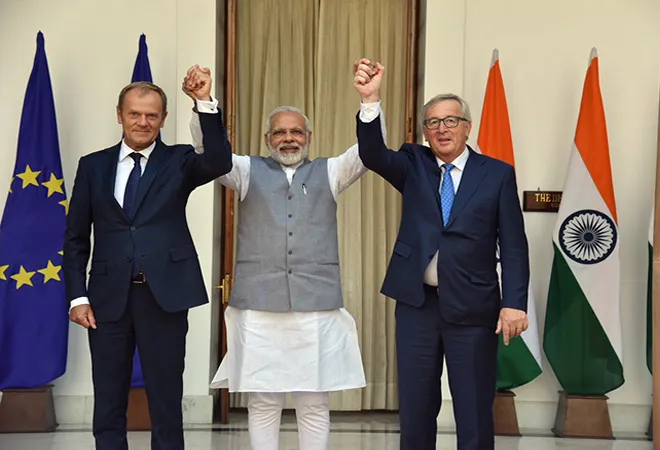The 14th India-European Union summit ended earlier this month with the two sides agreeing to strengthen trade and security ties. Yet this was a summit that had begun with much expectation but failed to achieve substantive outcomes on the key front of trade. The most significant achievement of the summit was the two sides deciding to work together against terrorism and expanding cooperation in the security realm. The joint statement strongly condemned "the recent terror attacks in Pathankot, Uri, Nagrota, Anantnag (Amarnath Yatra), Srinagar, Paris, Brussels, Nice, Berlin, London, Stockholm, Manchester, Barcelona, Turku, and other terrorist attacks..." "Recalling the November 2008 terror attacks in Mumbai, the leaders called for the perpetrators of these attacks to be brought to justice." India and the EU have also decided to boost cooperation on maritime security in the Indian Ocean and beyond which will lead to enhanced military cooperation between them. The resumption of tactical exercise in the Gulf of Aden between the EU's naval force and the Indian navy will lay the foundation for the two sides working with each other on managing the global commons.
Other issues, such as climate change and urbanization, also saw growing convergence between the two sides. The Indian prime minister, Narendra Modi, reiterated India's commitment to the Paris Agreement. "On clean energy and climate change, we are both committed to the 2015 Paris Agreement. Addressing climate change and promoting secure, affordable and sustainable supplies of energy are our shared priorities. We also reaffirmed our commitment to undertake mutual cooperation for reducing the cost of deployment of renewable energy," said Modi. Interestingly, the Rohingya crisis, too, found a mention with both sides taking note "that this violence was triggered off by a series of attacks by Arakan Rohingya Salvation Army (ARSA) militants which led to loss of lives amongst the security forces as well as the civilian population."
The EU is passing through a difficult phase. Brexit is yet to be operationalized and many member states are questioning the authority of Brussels on core issues pertaining to national sovereignty.
The Catalan crisis has further underscored the relevance of sovereignty debates in the region, something that some in Brussels thought is passé. This change was reflected in the EU's reassurance to India that even after Brexit nothing much would change in India-EU ties. The EU is one of the largest investors in India, accounting for more than 13 per cent of India's global trade. "The trading is almost perfectly balanced, with equal amounts of imports and exports on both sides. All this will remain true beyond March 2019, when United Kingdom leaves the EU," said Jean-Claude Juncker, the European Commission president.
But what was disappointing for many was that even this year the summit failed to make any headway on the resumption of the long-stalled negotiations for a free trade agreement. Negotiations for the proposed EU-India Broad-based Trade and Investment Agreement were launched in June 2007 and, since then, have struggled with many hurdles, including major differences on crucial issues like intellectual property rights and duty cut in automobile and spirits. Despite the commitment of top leaderships in both India and the EU, movement on trade talks remains lackadaisical. The commerce minister, Suresh Prabhu, had also had a 'productive' engagement with Cecilia Malmström, the European Union trade commissioner, in Marrakech but no concrete steps are in the offing yet.
After the last round of talks in 2013, there is a deadlock on issues, including tariffs on automobiles and wines and spirits. India has an interest in getting a favourable package on services, including declared interests in information technology and the movement of Indian professionals.
Market access for agricultural products, pharmaceuticals and textiles is also a priority for India. For the EU, concessions in the financial services are the key. The EU is also keen on the automobile sector where it is seeking a reduction in tariffs - much to the consternation of the Indian automobile industry - as well as a strong intellectual property regime. India would like to discuss a comprehensive Free Trade Agreement, including investment, while the EU wants to conclude the bilateral investment treaty first.
The conclusion of this agreement will be important not only for India's further integration into the global economy but also for giving a boost to India-EU ties that have failed to achieve their full potential.
Juncker made it clear that "it is the time for a Free Trade Agreement between India and the European Union. Once the conditions are right, and only when the conditions are right we resume (talks)." It remains to be seen if India and the EU can work on the momentum generated by the recent summit to conclude this important negotiation soon. Otherwise, sceptics, who doubt the 'strategic partnership' between India and the EU, would be proven right.
This commentary originally appeared in The Telegraph.
The views expressed above belong to the author(s). ORF research and analyses now available on Telegram! Click here to access our curated content — blogs, longforms and interviews.




 PREV
PREV


